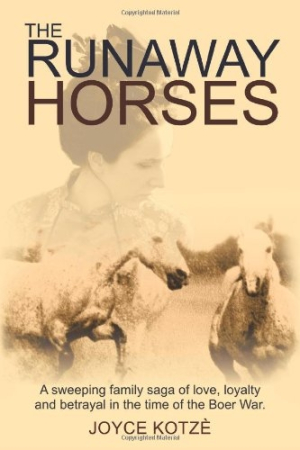The Runaway Horses
A Sweeping Family Saga of Love, Loyalty and Betrayal in the Time of the Boer War
In The Runaway Horses, Joyce Kotzè tells a fictionalized account of the Second Anglo-Boer War in South Africa, a war in which her own grandfathers fought on opposite sides. Dutch (Boer) settlers in Transvaal and the Orange Free State initially won independence from the British Empire in 1881. Kotzè’s novel begins in 1886, when Martin, Stefanie, Karel, and Rudolf de Winter, children of a Boer farmer and his English-born wife, meet their English cousins, Charles and James Henderson, sons of their mother’s sister. First reluctant to welcome the Hendersons, the de Winters soon form solid bonds with their cousins. As they all near adulthood, conflict over gold deposits near Johannesburg threatens to erupt into renewed war between the Boer states and the British Empire.
The title of the book refers to a parable told to the de Winter children by their father. When a spooked stallion rouses a herd of wild horses into stampede, the fearful ones panic and run away, becoming outcasts. Similarly, soldiers who panic in battle and desert are shunned as cowards. The six cousins, divided between loyalty to country and love of family, learn this truth as war threatens to destroy them.
While he is a student in England, Martin falls in love with Victoria. Because he is planning a political career in South Africa, Martin cannot marry an Englishwoman. But the lovers share one night together before saying goodbye. Later, when war is imminent and both Martin and Charles are living in South Africa, Charles tells Martin that James and Victoria have unexpectedly married. Martin says angrily, “For three years I have tried my utmost to put her out of my mind…Hoping never to come across her again. Why my very own cousin?”
Identical twins Rudolph and Karel, still teenagers when the Second Anglo-Boer War begins in 1899, discuss how their older brother, Martin, a Boer commander, might react to James, an enemy cavalry officer, in the heat of battle. The author ably delineates the inseparable twins. Rudolph, the sensitive thinker, wonders if Martin will have the courage to confront James “in the firing line.” Karel, the strong-willed one, replies, “Yes, I believe he will. Martin does everything the Volk [nation] expects of him.”
Kotzè skillfully weaves together the diverse elements of this historical period, describing rural life of Boer farmers, military hierarchy, social events of privileged English and South Africans, horrific battle scenes, and espionage. She connects these plot points with a compelling narrative flow. Of particular note is Tante Kobe, a Boer relative who offers homespun wisdom to the cousins, teaching them that love always triumphs.
Typographical errors in the text intrude only slightly, and a helpful glossary translates the Boer words that are found throughout the book.
Readers who enjoy well-drawn historical fiction will find The Runaway Horses difficult to put down. The book merits a wide audience.
Reviewed by
Margaret Cullison
Disclosure: This article is not an endorsement, but a review. The publisher of this book provided free copies of the book and paid a small fee to have their book reviewed by a professional reviewer. Foreword Reviews and Clarion Reviews make no guarantee that the publisher will receive a positive review. Foreword Magazine, Inc. is disclosing this in accordance with the Federal Trade Commission’s 16 CFR, Part 255.


